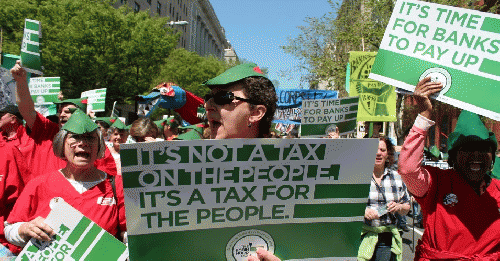Reprinted from Common Dreams

Demonstrators hold signs in support of a financial transactions tax (FTT), also known as a Robin Hood tax.
(Image by (Photo: Elvert Barnes/flickr/cc)) Details DMCA
The New Yorker ran a rather confused piece on Gary Sernovitz, a managing director at the investment firm Lime Rock Partners, on whether Bernie Sanders or Hillary Clinton would be more effective in reining in Wall Street. The piece assures us that Secretary Clinton has a better understanding of Wall Street and that her plan would be more effective in cracking down on the industry. The piece is bizarre both because it essentially dismisses the concern with too big to fail banks and completely ignores Sanders' proposal for a financial transactions tax which is by far the most important mechanism for reining in the financial industry.
The piece assures us that too big to fail banks are no longer a problem, noting their drop in profitability from bubble peaks and telling readers:
"...not only are Sanders's bogeybanks just one part of Wall Street but they are getting less powerful and less problematic by the year."
This argument is strange for a couple of reasons. First, the peak of the subprime bubble frenzy is hardly a good base of comparison. The real question is should we anticipate declining profits going forward. That hardly seems clear. For example, Citigroup recently reported surging profits, while Wells Fargo's third quarter profits were up 8 percent from 2014 levels.
If Sernovitz is predicting that the big banks are about to shrivel up to nothingness, the market does not agree with him. Citigroup has a market capitalization of $152 billion, JPMorgan has a market cap of $236 billion, and Bank of America has a market cap of $174 billion. Clearly investors agree with Sanders in thinking that these huge banks will have sizable profits for some time to come.
The real question on too big to fail is whether the government would sit by and let a Goldman Sachs or Citigroup go bankrupt. Perhaps some people think that it is now the case, but I've never met anyone in that group.
Sernovitz is also dismissive on Sanders' call for bringing back the Glass-Steagall separation between commercial banking and investment banking. He makes the comparison to the battle over the Keystone XL pipeline, which is actually quite appropriate. The Keystone battle did take on exaggerated importance in the climate debate. There was never a zero/one proposition in which no tar sands oil would be pumped without the pipeline, while all of it would be pumped if the pipeline was constructed. Nonetheless, if the Obama administration was committed to restricting greenhouse gas emissions, it is difficult to see why it would support the building of a pipeline that would facilitate bringing some of the world's dirtiest oil to market.
In the same vein, Sernovitz is right that it is difficult to see how anything about the growth of the housing bubble and its subsequent collapse would have been very different if Glass-Steagall were still in place. And, it is possible in principle to regulate bank's risky practices without Glass-Steagall, as the Volcker rule is doing. However, enforcement tends to weaken over time under industry pressure, which is a reason why the clear lines of Glass-Steagall can be beneficial. Furthermore, as with Keystone, if we want to restrict banks' power, what is the advantage of letting them get bigger and more complex?
The repeal of Glass-Steagall was sold in large part by boasting of the potential synergies from combining investment and commercial banking under one roof. But if the operations are kept completely separate, as is supposed to be the case, where are the synergies?
But the strangest part of Sernovitz's story is that he leaves out Sanders' financial transactions tax (FTT) altogether. This is bizarre, because the FTT is essentially a hatchet blow to the waste and exorbitant salaries in the industry.
Most research shows that trading volume is very responsive to the cost of trading, with most estimates putting the elasticity close to one. This means that if trading costs rise by 50 percent, then trading volume declines by 50 percent. (In its recent analysis of FTTs, the Tax Policy Center assumed that the elasticity was 1.5, meaning that trading volume decline by 150 percent of the increase in trading costs.) The implication of this finding is that the financial industry would pay the full cost of a financial transactions tax in the form of reduced trading revenue.
The Tax Policy Center estimated that a 0.1 percent tax on stock trades, scaled with lower taxes on other assets, would raise $50 billion a year in tax revenue. The implied reduction in trading revenue was even larger. Senator Sanders has proposed a tax of 0.5 percent on equities (also with a scaled tax on other assets). This would lead to an even larger reduction in revenue for the financial industry.
It is incredible that Sernovitz would ignore a policy with such enormous consequences for the financial sector in his assessment of which candidate would be tougher on Wall Street. Sanders FTT would almost certainly do more to change behavior on Wall Street then everything that Clinton has proposed taken together by a rather large margin. It's sort of like evaluating the New England Patriots' Super Bowl prospects without discussing their quarterback.





